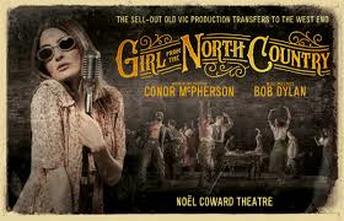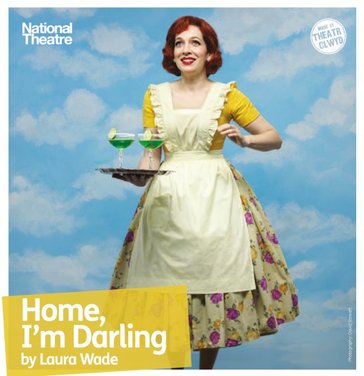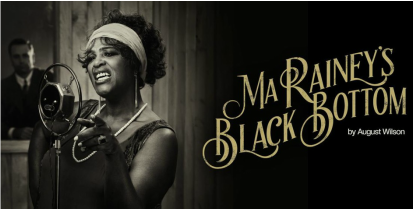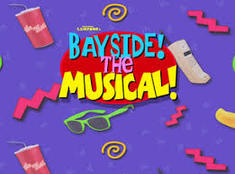 The Annual Oscar Roundup: All (Not All) The Movies We Need To Discussby Randi / March 2, 2018
The Annual Oscar Roundup: All (Not All) The Movies We Need To Discussby Randi / March 2, 2018As I’ve said hundreds of times, I love going into shows cold, not knowing any spoilers, not knowing the words to all the music yet, just a blank slate ready to be won over. But I may have gone overboard this week because not only did I know nothing about London’s new play “The Girl from North Country”, I knew wrong information. I thought this was about farming life in Ireland. Cue all the laughing-crying emojis because it’s about MINNESOTA. Duluth, specifically. I guess that is easily confused with Dublin? Regardless of my hysterical laughing when the show started and I heard them say ‘Duluth, Minnesota’ (internalized laughing, of course), and despite the awkwardness of this disjointed, rickety show, it’s a nice piece of theatre, enjoyable in spite of itself.
There are two patent examples of large, bad decisions that aren’t compelling. One is the completely annoyingly unnecessary framing device of the narrator. One actor, who plays the town doctor, also narrates the story and gives a lot of details to the audience that we don’t need. Using this needless device shows a lack of faith in the story to present what the author is aiming for. And never once did the narrator’s monologues share anything worthwhile to the story or anything that would not have been better left to the imagination. The play is pretty decent as is, but this device, borne out of a lack of confidence, distracts from the parts of quality.
The second example is the reason why I haven’t used the word ‘musical’ yet, even though everyone else (and the Oliviers) calls this production a musical. To me, it is the very epitome of a play with music, not a musical, because the music does not drive the story-telling. Instead of having the characters sing to each other to further the plot, a play with music uses the songs for their own sake unrelated to the plot, like in “Lady Day at Emerson’s Bar & Grill” when Billie Holiday was simply performing at a concert. This isn’t necessarily a bad thing to choose, not at all, but the use of the chosen music seems haphazard. The music should still be well considered and there for a reason, and if the characters in the show are singing, the songs chosen should somewhat reflect on them enough to make sense. Here, the songs sometimes make sense, but often don’t. The one thing I knew going in was that this show uses the music of Bob Dylan. So every so often, the characters will sing a Bob Dylan song, and it will have nothing to do with the plot, but the problem was they often didn’t make sense for the characters or for what the show was ostensibly trying to achieve. I’ll point to specific examples later.
Aside from these missteps (huge as they are), the show is decent, inoffensive and overall pleasant. It tells the story of the Laine family in Duluth, headed by the stern, imposing Nick (Ciaran Hinds (I know)), whose wife Elizabeth (Shirley Henderson) is suffering from a form of dementia that keeps her alternating between having no idea what is going on to having zero filter on her speech and actions. Their son, Gene (Sam Reid), has amounted to nothing and is a piece of a nothing shithead, we see because of how he treats a black man, but I honestly think the writer wants us to feel bad for him for some reason, which um no. Their daughter, Marianne, is a black woman (Sheila Atim) that was left in their inn as a baby, so they decided to raise her as their own. There’s a whole other show to be made just about this relationship and how their town reacted to it, but we strangely don’t get much in the way of racial unease, which is odd because it for sure would have created some. I wonder if the writer wanted us to think highly of all the characters for not calling attention to this, but it just seems unrealistic. I mean come on it’s Minnesota in the 1930s. Or, it’s America at any time. People would have torches.
Marianne is pregnant, and single – she won’t tell anyone who the father is. At one point, she tells someone that she was impregnated by the ghost of the wind of Jesus or something weird like that and I have no idea what they were going for with that. It seemed meant to add a mystical element, but such an element had no business in a straightforward show like this. An old man in town, Mr. Perry (Karl Johnson), has offered to marry Marianne and raise the baby, which seems like a nice offer but he’s super ancient and Marianne is like nah thanks. Unfortunately, her father has no patience for her idealistic decision-making, wanting to marry someone she actually loves and all. Elizabeth, in one of her unfiltered episodes, shares that Mr. Perry once assaulted her when she was young (he’s hella old so he was an older man even when she was young) and no one seems to care, which is the most realistic part of this show. I love that Elizabeth, in all her raw, crude honesty, is often the only voice of reason in the community.
Soon two men arrive to spend the night, a man presenting himself as a reverend but he is really a slimy Bible salesman (Finbar Lynch (I mean can we talk about that name? that’s the real name of the actor. Man alive)), and a former boxer named Joe Scott. Joe for my performance was played by the understudy Emmanuel Kojo, and I couldn’t have been more thrilled because Kojo is one of the West End names I actually remember from several past productions, so lucky me. The men join existing guests Mrs. Neilsen (Debbie Kurup), a hot widow who is sleeping with Nick and maybe loves him even though he’s old and wrinkly and mean; and the Burke family, an older married couple with a grown but developmentally disabled son, Elias (Jack Shalloo). The Burkes have an interesting but ultimately unfulfilled storyline about how the grown son may have killed a woman unintentionally, and how they may be fleeing from the authorities. It sounds a lot worse than it is. Not the crime, the crime is bad, but how this fit into the show. It was random and nuts but it kind of all worked, because we’re learning about all the sad stories of those involved.
And then we have the town doctor (Adam James) who should have remained a doctor instead of moonlighting as a narrator.
The first act is actually quite well done. The chosen Bob Dylan songs, although they don’t really inform the story or characters, seem at least a little bit relevant. And if not, at least the choices are mediocre and not aggressively bad. The twangy Dylan sound of the less famous songs worked with this setting. It helps that I didn’t know 90% of the songs, so for a while everything seemed suitable and interesting. The second act, however, falls apart. They perform songs back to back (to back, I think) apropos of nothing, and you can feel the thing falling off the rails and see that the songs are the desperate attempt to keep it moving. Then, the character of Joe Scott, a really interesting, well performed and mysteriously drawn character, is done a huge disservice by having to sing “Hurricane”. This is not a song that jives well with the small, rural action of the play, a huge contrast to the other songs used, so it is seriously shoehorned in to make it fit, and it was a bad idea. Like I said, Joe is a former boxer, which seemed acceptable in the first act, but having him sing “Hurricane” made me think, wait, did they make up his backstory in order to fit this song? It’s hard to believe otherwise when the writing reveals him to have committed a robbery and be on the run from authorities. This is where they really lost me. Forcing this song into the show and molding the story around it felt so amateur and for all the damage it does to the story, the payoff is exactly nil.
After that, the action seems to happen without compelling reason shoring it up. Truly dramatic things occur, and rarely do they feel earned or warranted. Marianne’s character is poorly drawn, for such a central character, and her decision to leave town without saying goodbye to her family feels unjustified. It’s hinted at (more than hinted at) that Nick might resort to a little murder-suicide and just, like, what? And don’t get me started on the ambiguity of what actually happens to Elias (who has the second best musical performance of the night, but it is very ill-suited to the story).
What keeps the show largely afloat are the performances. Not all – most of the ensemble was obviously focusing on their American accents to the detriment of their acting. This was especially clear in the case of the poor sad Mrs. Neilsen, whose ‘I just came from my elocution class’-style of speaking was inappropriate for this setting. “Oh I will MEETUH you OUTUH-SIDUH,” she said once. She was the female equivalent of Gary Oldman when he guested on “Friends”, spitting all his t’s and popping all his p’s. Then we had other ladies giving full-on Fargo-style accents, dontcha know, because North Dakota is pretty much Minnesota, yah fer sure, so the clash was blatant and upsetting. Why don’t West End shows all have dialect coaches?? But the leading performances by Ciaran Hinds and Shirley Henderson are the compelling parts of this show and what makes it worth seeing. Ciaran, whose name I literally just found out yesterday is not pronounced as written (I’m sorry), as the gruff, well-meaning but wrong-headed patriarch Nick Laine, is so natural and believable. The tinge of his Irish accent works really well actually to convey mid-West America, and even though his character is wrong so often, he’s such an incredible actor that he makes you want to understand why.
The real star turn here is that of Shirley Henderson as Elizabeth Laine. At first, she just kind of sits in her chair and makes faces at the goings-on, and I was thinking ‘she got an Olivier nomination for this?’ However, slowly but surely her performance grows and builds so much that I would honestly think about voting for her over the “Follies” ladies. (Don’t get me started on the fourth nom.) I didn’t know at first that Shirley was that Shirley, the one I know best as Bridget Jones’s brunette friend and as Moaning Myrtle in Harry Potter. Yeah, her. She’s fantastic. Her portrayal of a woman with dementia is so honest and uncomfortable and you have fremdschamen watching the whole time and you want to look away because it’s so painful, funny at times but painful, but you can’t because what she is doing is extraordinary. It’s mostly a physical role, peppered by line deliveries that could not be more perfect. She takes these words and chews them up and spits them out at such perfect moments with timing and venom that could be deadly. And then when she breaks into song, my goodness, I had no idea this lady could sing. She has the strongest voice in the whole production (and gets to do most of “Like a Rolling Stone”) and why hasn’t she been in more musical theatre? She could have single-handedly been saving British musical theatre! (Okay they still need someone besides Tim Minchin who can write scores but still.) Her performance is remarkable, how she does so much with so little and makes you invested in this story for her sake.
So clearly there are a lot of things wrong with this show, but in spite of all of that, it’s still enjoyable and a little bit moving, which I think is a testament to the performances, and also the writing. If this play could have been just a play, forgetting the weird Bob Dylan constraints, and if Conor had someone reigning him in and editing this draft, it could have been excellent. As it stands, it’s just fine, but entertaining.
AUDIENCE
Oh the joy – this was one of the best audiences I’ve witnessed in London. I didn’t see ANY phones during the show – and I was sitting in the way way back of the stalls, which usually means all you see is phones. There was a super old lady singing along sometimes and slapping her knees to the music and I shot her death stares but she was so old that that was probably dangerous. The girl next to me was coughing literally the entire first act so I moved for the second so that was fine. Honestly, most of the bad behavior came from the ushers I heard talking in the back and the back of house staff I could hear through the doors! Nonsense! Cameron Mackintosh better get his people under control.
STAGE DOOR
There were only like one or two weirdos there so I didn’t want to stay too long and also be a weirdo. The cast seemed super uninterested in talking to anyone anyway so best to skip this one.
Update: The show, with a new cast, will return to the West End from December 10, 2019 for 8 weeks.







